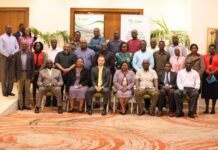By Adil El Youssefi, CEO Liquid Telecom Kenya
Artificial intelligence offers the promise of transforming agriculture in ways that could save over 815 million people, or 11% of the world’s population, from hunger: most especially in Africa, where the sector accounts for 32% of GDP and two-thirds of employment.
As at now, three-quarters of Africa’s farmers practice traditional farming techniques that deliver low yields, despite agriculture being their main source of livelihood.
But, to illustrate the change that is possible, app developers, such as Kenyan botanist and biochemist, Samuel Kamya, are delivering new solutions that could lift the continent’s agricultural output. Kamya’s app, Eska, detects crop diseases and deficiencies in soils of vital nutrients such as phosphorus. The app enables Kenyan farmers to send photos of their crops using a smartphone’s back camera and, instantaneously, diagnosing the health of the crop and any issues with pests or diseases and displays the results on their phone’s screen.
This is just one of the many new ways in which software and smartphones are being used to apply artificial intelligence in overcoming pest infestation, attacks by diseases, and nutrient deficiencies, in order to increase farm production.
Farmers are also, increasingly, using sensors and soil samples to gather data. This data is then stored in on-farm management systems that allow for better processing and analysis.
AI is now helping with supply chain tracking and market positioning.
Typical has been a coffee traceability solution that has been launched in Ethiopia, based on mobile technology, analytics and the Internet of Things. The solution is now tracking as many as five million bags of coffee through all stages of the supply chain, helping firms achieve fair trade and organic certification for their products.
The system has been a major boost for the coffee industry in Ethiopia, enabling farmers to better compete in the international coffee market and lifting Ethiopian coffee exports.
AI is also set to reduce the high levels of repetitive and physical work that drain resources and that have deterred many in the younger generation from farming in Africa.
In this, drones are now being used ever more widely to collect farming data, which has been found to be 93% accurate, yet the drones can collect the same amount of data in 10 minutes that it previously took farmers 8 hours to collect on foot.
This data collection is leading directly to higher outputs. Typical is the Aeroview platform developed by South African company Aerobatics, using AI, satellites and drones. The platform uses drone imagery to map regions and individual crop rows of stressed plants, from which the system’s analytics identify problem areas.









